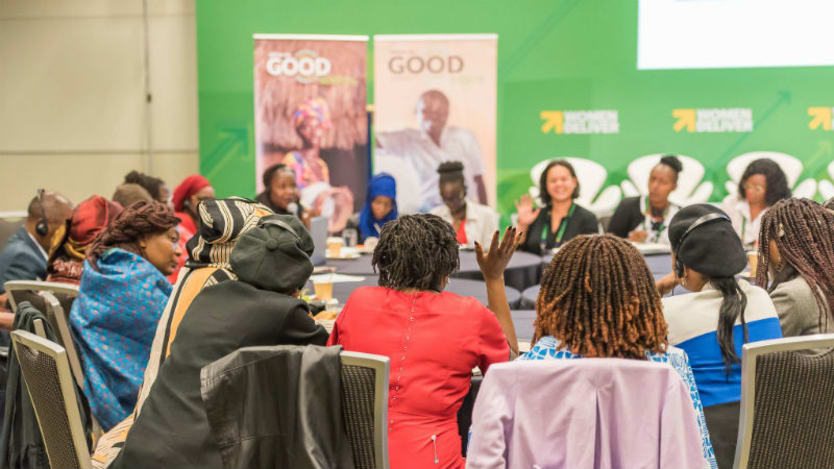
In June, more than 8,000 advocates — from civil society, the private sector, government, and more — came together to imagine a better world: a place where gender equality is the everyday norm across the planet.
All of us recognize that when women are healthy, productive, and active, the effect on their families, communities, and economies creates a better tomorrow. The rich dialogue throughout the conference made clear that business and the private sector have a powerful role to play to make gender equality a reality. We also recognized that there continues to be meaningful opportunities for collaborations and bigger impact.
At the end of the conference, Women Deliver President and CEO Katja Iversen asked all participants, “how will you use your power for good when you get home?” In response to Iversen’s challenge, we are continuing to advance three areas to deliver on the private sectors’ commitment to helping women deliver.
“We must always consider gender equality in our work from our partnerships and investments in improving health, to creating and upholding our own workplace values.”
—1. Developing radical collaborations to mobilize resources
Conversations throughout the conference highlighted the need for more resources and capital to advance gender equality and improve health. More financing is needed to fuel the frontlines of the fight for gender equality, and not just from a traditional donor model. We need new, radical collaborations that don’t just focus on the financial sources but bring together all partners at the start.
The future of women at work is alarming — and promising, new report shows
Can stakeholders come together to ensure an evolving world of work leads to more productive, better paying jobs for women around the world? McKinsey Global Institute takes a peek at the future to see if automation can work for women.
For example, during the conference, we announced a new partnership that will mobilize private capital to improve maternal and child health in regions with high mortality rates. The new Financing for MOMs — or Maternal Outcomes Matters — Alliance will secure up to $50 million to scale innovations with sustainable business models that expand infrastructure, services, and access to care.
We’re working with the Overseas Private Investment Corporation, the U.S. government’s development finance institution, the U.S. Agency for International Development, and Credit Suisse in a collaboration between public and private sectors as well as the health care and finance industries. Together, each partner brings unique expertise to maximize the impact of the large-scale investment. We see this model as the future and we welcome others to join us.
By coming together at the same table to learn and co-create agile programs that can respond to learnings in real-time and provide better care to women and families, we’ll be able to ensure the future of this gender equality movement.
2. Create inclusive environments that value women’s experiences
We must recognize who was not at the conference and make sure they are part of the conversation and at the table as we move forward. For instance, we were humbled by the opening ceremonies and thank Women Deliver for helping to elevate the voices of indigenous communities in Canada and beyond.
During the week, we had in depth conversations with our partners from Canada — Alberta Health Services, Pregnancy Pathways, and Seventh Generation Midwives Toronto — who are working with pregnant indigenous women as they seek housing and support both before and after childbirth. They shared the major barriers that the indigenous community faces in receiving quality health care — for example limited housing and transportation, a lack of cultural safety in clinical settings, inadequate access to mental health care, and substance use services for new parents.
Multisectoral solutions, including from the private sector, will be required to address these barriers as well as inform innovative, funding strategies for sustainable change.
3. Apply a gender equality lens to our own work
We can deliver more when working together to achieve gender equality, which includes not only reducing maternal mortality through our Merck for Mothers initiative but fostering conversations about gender equality in our everyday work.
For example, Merck and P&G proudly announced the Deliver for Good Campaign Business Ally Network, designed to break down barriers across sectors and address inequality. As part of this groundbreaking coalition, we will join other private sector leaders in sharing our experiences as women leaders in the workplace and foster best practices to improving gender equality in the workplace. Efforts will result in a concrete action plan for the effective implementation of policies, programs, and investments that reflect the important role girls and women play in achieving the Sustainable Development Goals.
As Merck CEO, Ken Frazier, reminded us during the plenary session, “what we need to be able to do is to work in partnership with governments, with NGOs, with civil society, in order to attack these problems in a comprehensive way, and that’s what we hope to do as a company at Merck.”
Now that we are back to business, it cannot be business as usual. We must always consider gender equality in our work from our partnerships and investments in improving health, to creating and upholding our own workplace values. Here at Merck, we will continue to help deliver on the promise of a gender equal world.
Merck for Mothers is known as MSD for Mothers outside the U.S. and Canada.









